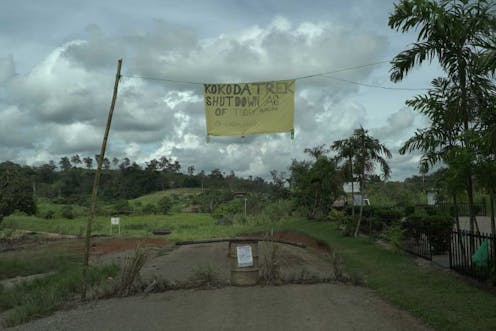Kokoda Track blockade alludes to deeper development issues in Papua New Guinea
- Written by Nicholas Ferns, Teaching Associate, Monash University

In recent days, several local landowners have blocked the Owers Corner end of the famed Kokoda Track in Papua New Guinea. They claimed they would stop tourists from accessing the track until the PNG government meets their demands.
According to their spokesman James Enage, government promises of economic benefits have not been fulfilled. Understaffed health centres and lack of education funding are causing great resentment among the local population. This is despite the establishment of the Kokoda Initiative, a joint undertaking between the Australian and Papua New Guinean governments that aims to “improve the livelihoods of communities along the track”.
The closure of the Kokoda Track by local landowners is not unprecedented; a similar closure took place at the Kokoda end in 2009.
The current blockade is a product of the complex political and economic issues affecting PNG, which is still dealing with the consequences of a controversial election late last year. It also highlights the complicated relationship between Australian war memory and its developmental assistance to a former colonial possession.
Australian aid preserving ‘hallowed ground’
The Kokoda Track experienced a resurgence of Australian attention following Prime Minister Paul Keating’s 1992 visit. He famously kissed the “hallowed ground” of the former battlefield.
In the 2000s, increasing numbers of Australian visitors sought to make the arduous trek, retracing the footsteps of former Australian soldiers. But with increased visitors came increased pressure on the local population.
In response to growing local discontent (which resulted in the 2009 blockade), the Kokoda Initiative Development Program was established in 2010 to improve living standards in areas along the track. The program includes educational services, provision of health supplies and infrastructure, and maintenance of the track itself.
Despite Australian government claims to have established several of these services, the protests at Owers Corner suggests that Australian aid is not making its way to the intended recipients. This is a common issue in aid delivery, particularly in remote areas such as those along the Kokoda Track.
Maintaining the Kokoda Initiative’s effective implementation is vital to ensuring the local population is able to enjoy the benefits of increased Australian visits to the track.
PNG’s health crisis
Compounding the problems with Australian aid are domestic issues related to the provision of health services throughout PNG. According to the country’s shadow minister for health and HIV/AIDS, Joseph Yopyyopi, PNG is suffering from a “health crisis”. Health workers are going without pay, and numerous hospitals are running out of basic supplies and medicines.
All of this comes despite Prime Minister Peter O’Neill’s promise of free education and health for all. But, if anything, the PNG population’s health has been in decline since O’Neill came to power. There is also little prospect of things changing quickly, given the unstable political situation following the 2017 election.
The Lowy Institute’s Jonathan Pryke and Paul Barker argue that Papua New Guineans experience lower health standards now than during the Australian colonial period prior to 1975. They suggest medical clinics are in crisis.
It is little surprise, then, that local communities suffering from the lack of health and education services have resorted to protests.
Striking a balance
Targeting the entry to a “sacred place” for Australians can be seen as a calculated move on the part of local PNG landowners. By preventing Australians from visiting the Kokoda Track, it is more likely that their grievances will be met.
It also points to a broader issue in PNG, as the problems people like Enage are facing are not isolated. Significant improvements are needed to improve basic services throughout PNG – not just along the Kokoda Track.
PNG continues to require significant amounts of Australian aid. According to 2017-18 budget estimates, PNG is to receive more than A$500 million, making it Australia’s largest aid recipient. This situation is very similar to the mid-1970s, when the colonial grant to PNG constituted two-thirds of Australian “aid”.
Australia’s Department of Foreign Affairs and Trade claims it is providing “tangible and lasting benefits” to the local communities surrounding the Kokoda Track. The blockade suggests this is not the case. Improved aid provision and governance within PNG is required to meet the needs of the people living near this “sacred place”.
Authors: Nicholas Ferns, Teaching Associate, Monash University





